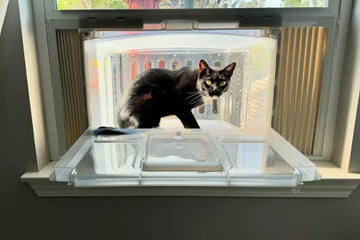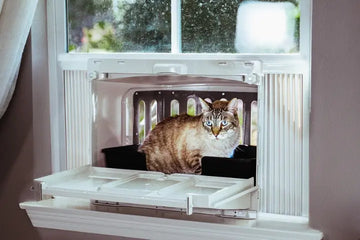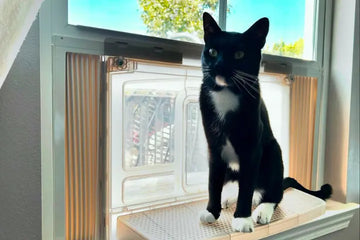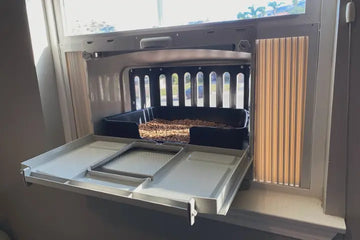Managing litter box odors is a common challenge faced by cat owners. It's not just about keeping the home smelling fresh; it's also about ensuring the comfort and health of the pet. Odors can arise from various sources, such as the type of litter used, the cat's diet, and the frequency of litter box cleaning. A lingering odor can discourage cats from using their litter boxes, leading to inappropriate elimination behaviors. Understanding the sources of these odors and the best ways to control them is crucial for maintaining a harmonious and hygienic living environment for both cats and their owners.
Understanding Different Types of Cat Litter
Clay-Based
Clay-based litters are a popular choice among cat owners due to their excellent absorbency and clumping capabilities. These litters are primarily made from bentonite clay, which effectively absorbs liquid and controls odor. The clay's natural properties allow it to form solid clumps when it comes into contact with cat urine, making it easier to scoop and remove waste. However, clay litters can be dusty and may not be the best choice for cats with respiratory issues. In terms of odor control, clay litters often contain added fragrances or odor-neutralizing agents like baking soda, enhancing their ability to keep the litter box smelling fresh.
Corn and Wheat-Based
For eco-conscious cat owners, biodegradable litters made from materials like corn and wheat are an excellent choice. These litters are environmentally friendly and offer good odor control. Corn-based litters are known for their natural absorbency and clumping ability, similar to clay litters, but without the dust. Wheat-based litters, on the other hand, are also absorbent and can be easily flushed, thanks to their biodegradability. Both types are effective in managing litter box odor, but they might be more susceptible to mold if not maintained properly.
Silica Gel
Silica gel litters are made from a form of silicon dioxide, which absorbs moisture and locks in odor effectively. These litters are low-dust and lightweight, making them a popular choice for those seeking a less messy alternative. Silica gel's high absorbency means it can go longer between changes, contributing to odor-free litter box maintenance. However, these litters can be more expensive than other types, and some cats may not like the texture. Additionally, they don't clump, which can make waste removal a bit more challenging.
Litter Box Maintenance Best Practices
Maintaining a clean and odor-free litter box is not just about scooping out clumps; it requires a holistic approach to ensure your cat's comfort and your home's freshness. First, understanding the type of litter and its specific maintenance needs is crucial. For instance, clumping clay litter might need more frequent scooping compared to silica gel litter. But regardless of the type, here are some essential steps:
- Daily Scooping: Remove clumps and solid waste every day. This prevents the buildup of odors and keeps the litter fresh for longer.
- Regular Cleaning: Clean the litter box with mild detergent and warm water every two weeks. Avoid harsh chemicals that might irritate your cat.
- Litter Replacement: Completely change out the litter as per the recommended frequency based on the type of litter and the number of cats.
- Proper Disposal: Dispose of the waste in a sealed container or bag to prevent odors from spreading in your home.
- Box Location: Place the litter box in a quiet, low-traffic area of your home, away from where you eat and prepare food.
- Ventilation: Ensure the litter box area is well-ventilated to help dispel odors.
- Monitor Your Cat's Usage: If your cat is avoiding the litter box, it might be a sign that the box isn't clean enough or that they're not happy with the litter type.
By following these steps, you can maintain the best cat litter box for odor control, ensuring a hygienic environment for your cat and a pleasant atmosphere in your home.
Natural Remedies and DIY Solutions
Vinegar and lemon juice are excellent natural cleaning agents that can be used in the routine maintenance of your cat's litter box. These substances are known for their natural disinfectant properties and ability to neutralize odors. To use, mix equal parts of water and vinegar, or add a small amount of lemon juice to water, and use the solution to clean the litter box. This method not only ensures a thorough cleaning but also leaves behind a fresh scent without the use of harsh chemicals. It's important, however, to thoroughly rinse the box after cleaning to prevent any lingering vinegar or lemon smell that might deter your cat from using the box.
Creating your odor neutralizers is a cost-effective and simple way to manage litter box smells. Baking soda is a highly effective odor absorber that can be sprinkled on the bottom of the litter box before adding the litter. It's non-toxic and safe for cats, making it an ideal choice for cat box odor control. Another option is to mix dried herbs, like lavender or mint, with the litter. These herbs not only combat odors but also provide a pleasant scent to the litter box area.
Deep cleaning of the litter box regularly is crucial for eliminating stubborn odors and maintaining a sanitary environment for your pet. This involves more than just scooping out waste; it means washing and sanitizing the entire box. A deep clean helps to remove lingering odors and bacteria that can accumulate over time, particularly in the corners and crevices of the box. This process, done every few weeks, is essential for keeping the litter box a no smell litter box, ensuring that your cat feels comfortable and your home stays fresh.
Dietary Influence on Waste Odor
The diet of your cat plays a significant role in the odor of their waste. Foods that are high in artificial additives, low-quality proteins, or are not well-digested can lead to stronger-smelling waste. On the other hand, a diet rich in high-quality, digestible proteins and balanced nutrients can result in less pungent odors. It's essential to choose cat food that not only meets the nutritional needs of your pet but also helps in minimizing litter box odors. This consideration is a key aspect of maintaining the best litter box for odor control.
Including supplements and probiotics in your cat's diet can improve their digestive health, which in turn can help control litter box odors. Probiotics are beneficial bacteria that aid in digestion and can reduce the occurrence of smelly waste. Supplements like omega-3 fatty acids can improve overall health and may also contribute to less odorous stools. It's important to consult with a veterinarian before adding any supplements to your cat's diet to ensure they are safe and beneficial. Proper digestive health is an integral part of managing litter box odor eliminator strategies.
Innovative Products and Accessories for Odor Control
When it comes to controlling litter box odors, there is a wide range of products available, each with its own set of benefits and limitations. To help you make an informed decision. Here's a quick rundown of the options:
- Self-Cleaning Litter Boxes: Automated waste removal, ideal for busy cat owners, higher cost.
- Odor-Absorbing Mats: Trap litter from paws, reduce tracking, some with added odor-control properties.
- Advanced Litter Box Filters: Use activated charcoal or similar substances, effective in neutralizing odors.
- Deodorizers: Can be added to litter or used around the box, a variety of scents and formulas are available.
- Enclosed Litter Boxes: Contain odors better than open ones, but require regular cleaning.
- Biodegradable Litter: Often naturally better at controlling odors, eco-friendly choice.
Each of these products offers unique benefits and may suit different preferences and lifestyles. Combining one or more of these solutions can lead to the most effective odor control, helping to maintain the best litter box for odor control in your home.
Selecting the Best Litter Box for Odor Control
When searching for the best cat litter box for odor control, several factors must be considered to ensure effectiveness and comfort for your cat. First, size matters; the litter box should be large enough for your cat to move around comfortably. Second, think about the depth of the box. Deeper boxes can hold more litter, which can be beneficial for odor control, but make sure it's not too deep for your cat to easily enter and exit. Third, the material of the litter box is important. Plastic is a common choice due to its durability and ease of cleaning, but it can absorb odors over time. Stainless steel or coated options might be better for long-term odor control. Lastly, consider whether an enclosed litter box would suit your cat's preferences and help in trapping odors more effectively.
User reviews and recommendations are invaluable resources when selecting the best cat litter box for odor. Other cat owners' experiences can provide insights into how well a litter box performs in real-life scenarios, especially regarding odor control. Look for reviews that specifically mention how long the litter box maintains freshness and any maintenance tips. Additionally, recommendations from veterinarians or cat care professionals can be highly beneficial, as they often have experience with a wide range of products and understand cats' needs well. Utilizing these resources can guide you to a no smell litter box that suits your and your cat's preferences.
To effectively manage litter box odors, it's important to stay consistent with the practices outlined in this guide. Regularly clean and maintain the litter box, be mindful of the type of litter you use, and pay attention to your cat's diet. Don't hesitate to experiment with different products and solutions to find what works best for you and your pet. With the right approach and tools, you can maintain an odor free litter box, ensuring a pleasant living environment for everyone in your household. Remember, a fresh-smelling home starts with a well-maintained litter box.


















































